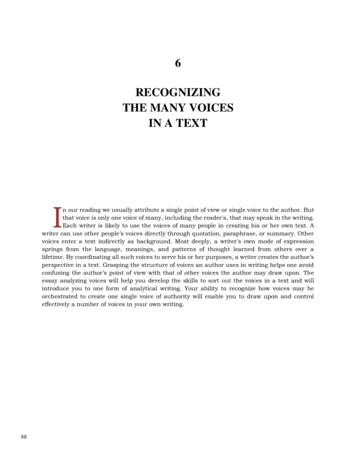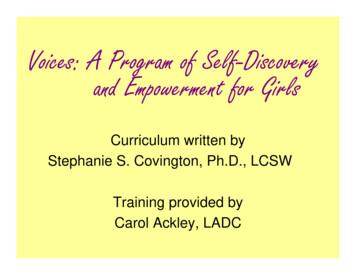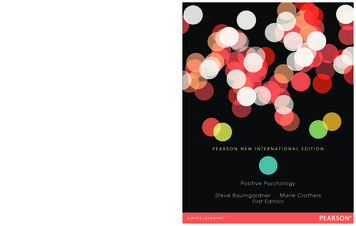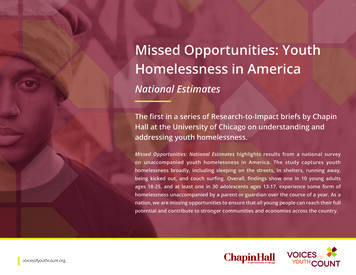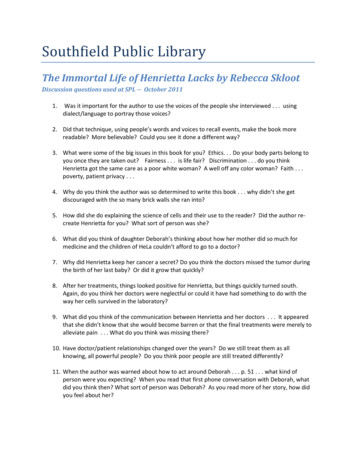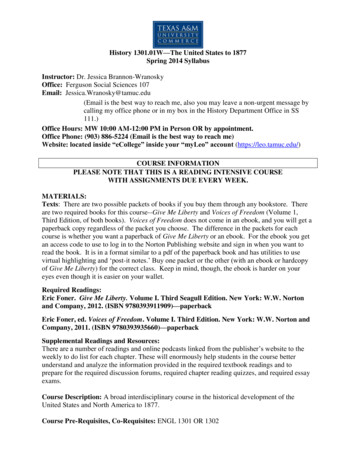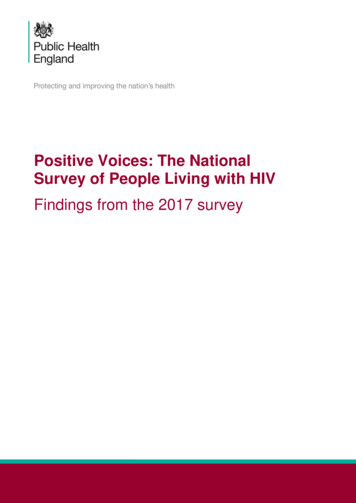
Transcription
Positive Voices: The NationalSurvey of People Living with HIVFindings from the 2017 survey
Positive Voices: the National Survey of People Living with HIV - Findings from the 2017 surveyAbout Public Health EnglandPublic Health England exists to protect and improve the nation’s health and wellbeingand reduce health inequalities. We do this through world-leading science, research,knowledge and intelligence, advocacy, partnerships and the delivery of specialist publichealth services. We are an executive agency of the Department of Health and SocialCare, and a distinct delivery organisation with operational autonomy. We providegovernment, local government, the NHS, Parliament, industry and the public withevidence-based professional, scientific and delivery expertise and support.Public Health EnglandWellington House133-155 Waterloo RoadLondon SE1 8UGTel: 020 7654 8000www.gov.uk/pheTwitter: @PHE ukFacebook: www.facebook.com/PublicHealthEnglandPrepared by: Meaghan Kall, Carole Kelly, Megan Auzenbergs and Dr Valerie DelpechInfographics by: Jane Shepherd www.janeshepherd.comFor queries relating to this document, please contact: positive.voices@phe.gov.uk Crown copyright 2020You may re-use this information (excluding logos) free of charge in any format ormedium, under the terms of the Open Government Licence v3.0. To view this licence,visit OGL. Where we have identified any third party copyright information you will needto obtain permission from the copyright holders concerned.Published January 2020PHE publicationsgateway number: GW-993PHE supports the UNSustainable Development Goals2
Positive Voices: the National Survey of People Living with HIV - Findings from the 2017 surveyAcknowledgementsWe are thankful for the contributions of the following people during various stages ofdevelopment, recruitment and analyses of the Positive Voices 2017 data: Dr EricaPufall, Chris Farey, Ifeoluwa Olowoniyi, Qudsia Enayat, Janice Morgan, Dr AndrewSkingsley, Tracey Cairns, Krishna Gupta, Sara Croxford, Sophie Nash and Dr AlisonBrown. Thanks to Positive East for organising cognitive interviews to pre-test thequestionnaire with their clients. We also thank Dr Kristy Foster, Dr Kevin Dunbar and DrJohn Saunders for their help to validate the long-term medical conditions.We thank the Positive Voices Advisory Group for their advice and guidance for theproject: Dr Richard Gilson (University College London), Dr Anthony Nardone (PHE), DrMaryam Shahmanesh (University College London), Prof Helen Ward (Imperial College)Prof Graham Hart (University College London), Prof Jane Anderson (HomertonUniversity Hospital), Yusef Azad (National AIDS Trust), Prof Jonathan Elford (CityUniversity), Dr Ann Sullivan (Chelsea and Westminster Hospital), Dr Cath Mercer(University College London), Dr Alan McOwan (Chelsea and Westminster Hospital),Jess Peck (NHS England), Prof Jackie Cassell (Brighton and Sussex Medical School),Julie Musonda (UK-CAB), and Jane Bruton (NHIVNA).We also thank Prof Noel Gill (PHE), Dr Paul Benn and Dr Alan Smith (formerly ofGilead Sciences Inc) for their committed support and funding for the survey.We are deeply indebted to all the 4,422 people living with HIV who completed thePositive Voices 2017 survey and to the clinical and research staff from 73 HIV clinicswho worked to recruit participants throughout the enrolment period at: 56 Dean Street (Dr Gary Whitlock, Lorraine O'Connell, Lucinda Hetherington)Addenbrookes Hospital (Dr Effrossyni Gkrania-Klotsas, Fiona Wilson)Barking Hospital (Dr Cecelia Theodore)Birmingham Heartlands Hospital (Dr Steve Taylor, Cynthia D'Aguilar)Bradford Royal Infirmary (Dr Nicola Fearnley, Sue Kimachia)Broomfield Hospital (Dr Huw Price, Suzanne Francis)Cardiff Royal Infirmary (Dr Darren Cousins)Castle Hill Hospital (Dr Kate Adams, Sarah Harrison)Charing Cross Hospital (Dr Ann Sullivan, Sophie Hobday, Maria Elena Noval)Chelsea and Westminster Hospital (Dr Ann Sullivan, Mini Thankachen)Derriford Hospital (Dr Zoe Warwick, Suzanne Price)Diana Princess of Wales Hospital, Grimsby (Dr Kate Adams, Sarah Harrison)Gloucester Royal Hospital (Dr Andrew de Burgh-Thomas, Alyson Esson)Gravesham Community Hospital (Brenda Hollier, Brian Connolly)Great Western Hospital, Swindon (Dr Jessica Daniel)3
Positive Voices: the National Survey of People Living with HIV - Findings from the 2017 survey Harrogate District Hospital (Dr Ian Fairley, Caroline Bennett, Joyce Guy)Hertford County Hospital (Dr Sarah Edwards)Homerton Hospital (Dr Iain Reeves, Monica James, Onoshoze Bossey)Hull Royal Infirmary (Dr Kate Adams, Sarah Harrison)iCaSH Huntingdon (Holly Donson, Claudia Krause, Malini Raychaudhuri)iCaSH Norfolk, Breydon Clinic (Dr Meena Gupta, Paul Nicolls)iCaSH Norfolk, Oak Street Clinic (Dr Nelson David, Paula Waplington)iCaSH Norfolk, Vancouver House Clinic (Dr Sivakumar Kanagaratnam, SandraUnderwood)iCaSH Peterborough (Dr Graham McKinnon, Lorraine Bishop)iCaSH Suffolk, Abbey View Clinic (Dr Sarah Edwards, Kathy Masoli, FelicityWilcock)iCaSH Suffolk, Orwell Clinic (Dr Raouf Moussa, Jo Woor)James Cook University Hospital (Dr David R Chadwick, Jane Knowles, MarieGibney)Kent and Canterbury Hospital (Brenda Hollier, Nikki Crisp)Kettering General Hospital (Dr Mohamed Ghanem, Claire Bailey, Sheila Nuttall)Kings College Hospital (Dr Chris Taylor, Lucy Campbell)Leeds General Hospital (Dr Sarah Schoeman, Michelle Loftus-Keeling)Lewisham Hospital (Dr Charles Mazhude, Hannah Kelly, Joyce Maravi)Lister Hospital (Dr Sundar Uthayakumar)Manor Hospital (Dr Joseph Arumainayagam, Rebecca Chell, Sally Gaunt)Mortimer Market Clinic (Dr Richard Gilson, Michelle Beynon)Newham University Hospital (Nathaniel Brito-Ault, Brian Thornton)North Manchester General (Dr Andrew Ustainowski, Gabriella Lindergard, ValerieGeorge)Northampton General Hospital (Dr Mohamed Ghanem, Tom Streeter)Nottingham City Hospital (Dr Ashini Fox, Kanchana Seneviratne)Princess Alexan (Dra Hospital (Dr Gail Crowe, Theresa Burke)Queen Elizabeth Hospital (Dr Stephen Kegg, Tessa Lawrence, Satwant Kaur)Queen Elizabeth Hospital, Birmingham (Dr Kaveh Manavi, Tarik Moussaoui, HocineAzzoug)Queen Elizabeth Queen Mother Hospital (Brenda Hollier, Nikki Crisp)Queens Hospital, Burton (Dr Carolyn Murray, Catherine Ormiston)Rotherham District General Hospital (Dr Nadi Gupta, Rachel Walker, NicolaWilliams)Royal Berkshire Hospital (Dr Emma Wainwright, Dr Fabian Chen)Royal Bournemouth Hospital (Dr Elbushra Herieka, Michaela Osbourne)Royal Free Hospital (Dr Fiona Burns, Nargis Hemat, Nnenna Ngwu)Royal Gwent Hospital (Dr Humphrey Birley, Dr Irene Parker)Royal Hallamshire Hospital (Dr Karen Rogstad, Charlie Hughes)Royal Liverpool University Hospital (Dr Mas Chaponda, Deven Williams)Royal London Hospital (Nathaniel Brito-Ault)4
Positive Voices: the National Survey of People Living with HIV - Findings from the 2017 survey Royal Sussex County Hospital (Dr Amanda Clarke, Helena Soviarova, LisaBarbour)Royal Victoria Hospital (Brenda Hollier, Nikki Crisp)Royal Victoria Infirmary (Dr Edmund Ong, Laura Shewan)Salisbury District Hospital (Dr Georgina Morris, Jenny Brown, Sarah Diment)Scarborough General Hospital (Dr Ian Fairley, David Thompson)Scunthorpe General Hospital (Dr Kate Adams, Sarah Harrison)Sir Robert Peel Community Hospital (Catherine Ormiston, Johanne Tomlinson)Southend University Hospital (Dr Henna Jaleel, Laura Hilton, Dawn Gayford)Southmead Hospital (Dr Mark Gompels, Louise Jennings, Lana Ward)St George's Hospital (Dr Mark Pakianathan, Olanike Okolo)St Mary's Hospital, Imperial (Dr Nicola Mackie, Rory Collins, Kenneth Legg)St Mary's Hospital, Isle of Wight (Felicity Young)St Peter's Hospital (Dr Sum Yee Chan, Claire Atkinson)Upton Hospital (Dr Nisha Pal, Rhona Merricks)Watford Clinic (Samantha Hill, Katharine Lamb)West Middlesex Hospital (Dr Ann Sullivan, Ursula Kirwan, Marie-Louise Svensson)Weymouth Hospital (Dr Cecilia Priestley, Josie Goodsell, Hilary Loxton)Whipps Cross Hospital (Nathaniel Brito-Ault)William Harvey Hospital (Brenda Hollier, Nikki Crisp)Worthing Hospital (Dr Judith Zhou, Sarah House)York Hospital (Dr Ian Fairley, David Thompson, Peter Tovey)Suggested citationM Kall, C Kelly, M Auzenbergs, and V Delpech. Positive Voices: The National Survey ofPeople Living with HIV - findings from the 2017 survey. January 2020. Public HealthEngland: London.FundingThe Positive Voices survey was carried out by Public Health England, UniversityCollege London and Imperial College London and was supported by funding fromPublic Health England and research grants from Gilead Sciences Inc.Ethics approvalThis project was reviewed and approved by Health Research Authority and the LondonHarrow NHS Research Ethics Committee (Project ID 13/LO/0279).5
Positive Voices: the National Survey of People Living with HIV - Findings from the 2017 surveyContentsAbout Public Health England2Acknowledgements3Suggested citationFundingEthics y findings12Introduction16Positive Voices survey participants18Representativeness and weighting of the Positive Voices 2017 sampleHIV diagnosis and treatment1921Setting of first HIV diagnosisHIV treatment adherence and side effects2122Quality of life, health and well-being23Life satisfactionSelf-rated healthHealth-related quality of life (EQ-5D-5L)Mental health symptoms (GHQ-12)23242530Health conditions and medications32Long-term health conditions and multi-morbidityPolypharmacyCardiovascular conditions and medicationsJoint and bone conditions and medicationsCancer diagnosesMental health conditions and medicationsOther long-term health conditionsViral conditionsHealth service use and satisfaction333436373940424344HIV clinical service rating and satisfactionHIV patient-reported experience measures (PREMs)GP registration and disclosureGP practice rating and satisfactionGP service patient-reported experience measures (PREMs)GP attendanceNHS and social care services644454646464747
Positive Voices: the National Survey of People Living with HIV - Findings from the 2017 surveySex and Relationships48Relationships with main partnerSexual partnersSexually transmitted infections484950Women’s sexual and reproductive health51Lifestyle risk behaviours52Height, weight and BMIAlcohol and tobacco useRecreational drug useChemsex and slammingInjection drug use5253545556Stigma and discrimination57Disclosing HIV status outside healthcare settingsHIV-related stigma and discrimination in healthcare settingsHousing, work and finances575859HousingEmployment statusHousehold incomeSources of incomeAbility to meet basic needsAbility to keep up with bills595961626363Met and unmet needs64Use of HIV support servicesAccess to HIV support servicesHIV-related service needsHIV-related needsHealth needsSocial and welfare needs646565686869Appendix: Survey methodology80Sampling frameData CollectionData cleaningWeightingAnalysisNote on general population comparisons818182838484References867
Positive Voices: the National Survey of People Living with HIV - Findings from the 2017 surveyAbbreviationsA&E: Accident and emergency departmentAIDS: Acquired immune deficiency syndromeART: Antiretroviral therapyBMI: Body mass indexCOPD: chronic obstructive pulmonary diseaseDLA: Disability Living AllowanceEQ-5D-5L: a standardized instrument for measuring generic health status and quality oflife introduced by the EuroQol Group (EQ). It has 5 dimensions (5D) - mobility, self-care,usual activities, pain/discomfort, and anxiety/depression and 5 response levels - noproblems, slight problems, moderate problems, severe problems and extremeproblems.ESA: Employment and Support AllowanceGHB/GBL: Gamma hydroxybutyrate and gamma-Butyrolactone, also known as G orliquid ecstasy. A drug commonly before or during sex to enhance pleasure anddecrease inhibitions (chemsex).GHQ-12: General Health Questionnaire (GHQ-12) is a validated 12-item psychometricscreening tool developed to identify common psychiatric disorders and depressivesymptoms.GP: General practitionerGUM: Genitourinary medicineHARS: HIV and AIDS Reporting SystemHIV: Human immunodeficiency virusesHPV: Human papillomavirusHRQoL: Health-related quality of lifeJSA: Jobseeker's AllowanceKS: Kaposi’s sarcomaLGV: Lymphogranuloma venereumLTC: Long-term conditionNASS: National Asylum Support ServiceNHS: National Health ServiceONS: Office of National StatisticsPIP: Personal Independence PaymentPREMs: Patient-reported experience measuresPTSD: Post-traumatic stress disorderSTI: Sexually transmitted infectionU U: Undetectable untransmittableUK: United KingdomUNAIDS: The Joint United Nations Programme on HIV and AIDS8
Positive Voices: the National Survey of People Living with HIV - Findings from the 2017 surveyForewordsIt gives us great pleasure to introduce the Positive Voices 2017 report. The journey toget here spans several years of planning, piloting, implementation and analyses. Wehave worked closely with people living with HIV, academic partners and other keystakeholders to develop a nationally representative survey that captures the complexhealth and wellbeing of people living with HIV.There have been phenomenal advances in HIV medicine. Today, HIV treatment is soeffective that life expectancy for people with HIV is no different to those without, ifpeople are diagnosed and treated promptly. HIV treatment continues to evolve and formost, consists of taking one pill a day with few or no side-effects. There is also anotherpowerful gain to treatment – it suppresses virus replication so that a person ontreatment cannot pass HIV on to sexual partners. This is sometimes referred to U U(Undetectable Untransmissable).Given these medical developments, it should be expected that living with HIV is nodifferent to any other chronic condition. However, Positive Voices paints a morecomplex picture. Although many people with HIV rate their quality of life highly, overallpeople with HIV fared worse than the general population in many aspects.Most live with other health conditions with mental health conditions commonly reported,particularly depression. People with HIV continue to be treated differently andexperience HIV-related discrimination, with 1 in 10 avoiding seeking healthcare whenthey needed it due to fears of stigma. HIV is like no other health condition.This survey is the first of its kind and a major strength is that we were able to usenational HIV surveillance data as a sampling frame to include HIV clinics acrossEngland and Wales and ensure participation from people of all backgrounds, making ittruly representative of people living with HIV.Wherever possible the scales and measures used allowed allow us to compare thefindings to the general population. Finally, the sheer size of the survey (more than 4,400people took part – 1 in 20 people living with diagnosed HIV) means that we are able tolook at data in great detail and understand whether some people may experience unmetneeds for instance.We thank all of people living with HIV who provide their information for surveillance andresearch – the information is invaluable in understanding HIV. We particularly thank thepeople with HIV who completed the survey and who shared their stories to contextualisethe Positive Voices findings.9
Positive Voices: the National Survey of People Living with HIV - Findings from the 2017 surveyDr Valerie DelpechHead of HIV SurveillanceNational Infection ServicePublic Health EnglandMeaghan KallPrincipal HIV ScientistNational Infection ServicePublic Health EnglandIn February 2017, at regular check-up at my HIV clinic I was asked to fill in the PositiveVoices questionnaire. It was a bulky booklet and looked time consuming. But I was alsogiven a 5 voucher, and I had time to spare as I waited for my meds, so I filled it in whilesitting in front of the pharmacy.There were questions on all aspects of my life from experiences of the HIV clinic tomore personal stuff, like mental health, loneliness, violence, alcohol and drug use,experiences of stigma and discrimination and finances. I always find these kinds ofquestionnaires hard, especially if I’m feeling fragile (most people do feel fragile on adark February morning, during a hospital visit, even a routine check-up). I diligentlyanswered all questions and rewarded myself with a lovely hand cream with my voucher.Recalling negative experiences can be triggering, and many of us living with HIV haveexperienced trauma. However, I knew it was important that the life experiences ofpeople with HIV are heard, and that there is so much more to having a good quality oflife than just an undetectable viral load.I was also aware that even without doing much, I have often been the subject ofresearch, as have the other 100,000 people living with HIV in the UK. So much researchis done on us, but it is rare that we are actively involved in the process. Positive Voiceshas been different. Public Health England asked Positively UK, the UK leading peersupport organisation together with the National AIDS Trust, to facilitate communityownership and assist with analysis of the Positive Voices data. This project became theChanging Perceptions campaign and reports.10
Positive Voices: the National Survey of People Living with HIV - Findings from the 2017 surveyWorkshops were held with survey respondents to discuss the findings. Having workedin HIV peer support for 20 years what surprised me was that most people who attendedwere not our ‘usual’ service users. Many had never used support services or spoken tosomeone else living with HIV before. Most were compelled to come forward becausethey wanted to ensure that their lives and experiences mattered, and to help makethings better for everyone. There was a clear intention from us all that we did not wish tobe solely objects of research. Behind the numbers are lives. We are reclaiming ouragency and overcoming notions of victimhood, despite the challenges many still face.Positive Voices paints a nuanced picture of our lives. From a medical perspective, weare doing well thanks to the excellent HIV care provided by the NHS. However, many ofus are struggling: 1 in 8 had not told anyone about their HIV status,1 in 7 experienceddiscrimination in the NHS in the past year. Mental health problems are reported by halfof people living with HIV, around twice that of the general public.As we listened to each other’s stories and discussed how they illuminated the PositiveVoices findings, it was clear that the biggest challenges we face are rooted in negativeattitudes and misconceptions around HIV. Peer support is vital for tackling isolation andmaintaining well-being, yet it is underfunded and often unavailable.Positive Voices survey has offered a new clarity about life with HIV in the UK; clarityneeded to help people with HIV to stay healthy and have a good quality of life. I’d like tothank the researchers, Public Health England and everyone who completed the surveyand made this possible.www.changingperceptions.co.ukSilvia PetrettiChief Executive OfficerPositively UK11
Positive Voices: the National Survey of People Living with HIV - Findings from the 2017 surveySummary findingsThe Positive Voices 2017 survey was completed by a representative sample of 4,422people living with diagnosed HIV infection who were invited to take part through theirlocal HIV clinic between January and September 2017. The survey included 1 in 20people living with diagnosed HIV in England and Wales.HIV diagnosis and treatmentMore than half (53%) of people with HIV were first diagnosed with HIV in a sexualhealth clinic. This was highest proportion of those were gay and bisexual men (69%)and the lowest were women (37%). Additionally, 11% were diagnosed by a generalpractitioner (GP), 11% in a hospital outpatient department, and12% in hospital asinpatients. Amongst women living with HIV, 13% were first diagnosed in pregnancy.Self-reported adherence to HIV treatment was very high: 89% of people had taken alltheir HIV tablets in the previous 14 days. A further 6% had only missed one tablet. Onein 7 (17%) had side effects to their HIV medication in the previous 4 weeks.Quality of life, health and well-beingPeople with HIV reported high ratings on the 3 measures of health and well-being in thesurvey (self-rated health, life satisfaction, and health-related quality of life [EQ-5D]),reflecting excellent HIV treatment outcomes in the UK. However, compared to thegeneral population, the overall picture showed that people with HIV fared slightly worseacross all 3 measures.Mental ill health was a primary concern among people with HIV, who also experienced ahigher burden compared to the general English population. Over 1 in 3 (37%) peoplewith HIV were diagnosed with a clinical mental health disorder in their lifetime. Aroundhalf (49%) of people with HIV reported symptoms of depression and anxiety on the dayof the survey; much higher than in the general population (30%). One in 4 (28%) had aGeneral Health Questionnaire (GHQ-12) score of 4 or more indicating probable mentalill health at the time they were surveyed, compared to 19% of the general population.Over half (59%) reported ever having been diagnosed with a long-term condition inaddition to their HIV, most commonly high cholesterol, hypertension, arthritis andneuropathy. One in 3 (33%) were living with 2 or more long-term conditions in additionto HIV.12
Positive Voices: the National Survey of People Living with HIV - Findings from the 2017 surveyExperience with NHS care and servicesOverall, people reported a very positive experience with their HIV care, rating their HIVservices on average 9.3 out of 10. No disparity in HIV clinic satisfaction was seen byage, gender, ethnicity, socioeconomic status or across different areas of England andWales. Agreement with patient-reported experience measures (PREMs) was high: 96%felt supported to self-manage their HIV and 95% felt they were involved in decisionsabout their HIV treatment and care.Nearly all (98%) were registered with a GP, and of these, 94% said their GP knew theirHIV status. GP satisfaction was lower than HIV clinic satisfaction, with an average ratingof 6.9 out of 10. However, this was similar to GP ratings in the general population. Twothirds (65%) felt that their GP knew enough about HIV and 59% were comfortableasking their GP questions about HIV. One in 5 (20%) did not know whether their HIVdoctor and GP communicated about their health.Sex and relationshipsOver half (58%) of people living with HIV had a current main partner. Of those, 57% hadHIV negative partners, 39% had HIV positive partners, and 4% did not know theirpartner’s HIV status. People with HIV-negative partners were more likely to usecondoms (32% vs 15% of those with HIV-positive partners) and be sexually abstinent(36% vs 25% of those with HIV-positive partners). With over 95% of people with HIVvirally suppressed, is suggests not all people with HIV know or believe that having anundetectable viral load means they cannot pass on HIV sexually (undetectable equalsuntransmittable (U U)).One in 3 (36%) of people with HIV had not had sex in previous 3 months; rates ofabstinence increased with older age. Most people (94%) reported a close relationshipwith their partner. However, women were twice as likely to say they were not close totheir partners (10%) in comparison to men (5%).Lifestyle risk behavioursBody mass index (BMI) calculations indicated that 57% of people with HIV wereoverweight or obese (BMI 25), and 1 in 4 (24%) were obese (BMI 30). Overweight andobesity was highest among people of black African ethnicity; 80% of black Africanwomen and 71% of black African men.Drinking alcohol was common with 73% of people with HIV saying they ever drankalcohol and 49% were regular drinkers (at least weekly). Regular drinking was highestamong gay and bisexual men (65%) and lowest among people of black African ethnicity(27%) and women (24%).13
Positive Voices: the National Survey of People Living with HIV - Findings from the 2017 surveyOne in 5 (20%) were current smokers and a further 28% were ex-smokers. Smokingwas highest among gay and bisexual men (26%) and young people aged 18 to 34 yearsold (30%).Recreational drug use in the previous 3 months was highest among gay and bisexualmen (40%). In this group, the most common drugs used were cannabis (12%), nitrates(8%) and cocaine (7%). Overall, 20% of gay and bisexual men engaged in chemsex inthe previous 3 months, and 7% reported slamming (injecting).Recreational drug use was lower in other groups; 17% of heterosexual men and 5% ofwomen. Use of heroin and crack were rarely reported, at 0.5% and 0.8%, respectively.Stigma and discriminationOne in 8 (13%) people revealed that they had never told anyone about their HIV statusapart from healthcare staff. This proportion was highest among trans people (20%),heterosexual men (19%), people of black African ethnicity (17%) and other minorityethnicities (17%), and women (16%).Fear of discrimination in healthcare settings was prevalent, with 1 in 6 (16%) of peopleworried that they would be treated differently because of their HIV status. In theprevious year, 1 in 10 (10%) avoided seeking healthcare when they needed it and 1 in20 (5%) felt that they had been refused or delayed healthcare because of their HIVstatus.Housing, Work and FinancesThe unemployment rate among people with HIV was 14%, more than triple the 4%unemployment rate in the general UK population during the same period. This is despitepeople who participated in the survey being highly educated (44% were educated todegree level or higher). Unemployment was highest among trans people (17%), peopleof black African ethnicity (17%) and other minority ethnicities (14%), women (15%) andyounger adults (12% aged 18 to 34 and 12% aged 35 to 44).The median household income was 20,000 to 29,000 per year. Financial difficultieswere common; over half (53%) of those living with HIV did not always have enoughmoney for their basic needs (such as food, rent, gas, electricity) and almost a third(30%) had fallen behind with some or all of their bills. One in 4 (28%) were in receipt ofat least one form of means-tested welfare benefit and 15% were in receipt of a disabilitybenefit.14
Positive Voices: the National Survey of People Living with HIV - Findings from the 2017 surveyMet and Unmet NeedsOne in 6 people with HIV (16%) had contact with an HIV charity or voluntaryorganisation in the previous year, with a further 22% having had previous contact withthese type of support organisations. Despite this, a third of people with HIV (33%) said ithad become more difficult to access the support services they needed in the past 2years.When people living with HIV were asked about their need for 29 different types of HIV,health and social services in the previous year, the highest level of need was for HIVrelated services, such as: 63% needed HIV treatment advice, 49% needed informationabout living with HIV, 43% needed support managing their long-term conditions and42% needed adherence support.Common health-related needs were stress management (33%), psychologist orcounsellor (31%), weight management (31%) and help or advice regarding their sex life(27%). The greatest social and welfare needs were for housing support (23%), helpdealing with loneliness and isolation (21%) and help claiming benefits (20%).The greatest unmet need was for help dealing with loneliness and isolation: 75% ofthose who needed this help did not receive it. Similarly, 69% of the people needingcareer skills and training and 63% of need for employment advice did not have theirneeds met. Needs were also unmet for weight management (53%), smoking cessation(48%) and peer support or social contact with other people with HIV (43%).In contrast, the areas where the needs of people with HIV were mostly met included:HIV treatment advice (93% of need met), HIV treatment adherence support (93% ofneed met), and information about living with HIV (87% of need met).15
Positive Voices: the National Survey of People Living with HIV - Findings from the 2017 surveyIntroductionPublic Health England (PHE) is responsible for the national surveillance of HIV, whichincludes the reporting of new HIV diagnoses and monitoring the clinical outcomes ofpeople accessing HIV care. In 2017, 89,113 people accessed HIV specialist care inEngland and Wales; 95% of whom were on antiretroviral therapy (ART) and had asuppressed viral load1. Successful provision of HIV treatment has reduced the HIVmortality rate; as a result, the cohort of people with HIV is ageing, with 1 in 3 peopleaccessing HIV care now aged over 50 years.Patient-reported outcomes and experiences are an important part of understanding andmonitoring the health and well-being of people with HIV. This knowledge is particularlycrucial during a time when significant changes in the delivery of health and social careservices are occurring.Positive Voices is a national cross-sectional probability survey of people living with HIVand accessing care in England and Wales. It aims to identify factors that determine poorhealth outcomes and disparities among people with HIV. The findings will help informpatient-centred care and tailor the provision of HIV clinical and support services tobetter meet the needs of people with HIV into the future. This report presents the resultsof the first Positive Voices 2017 survey.It followed on from an extensive development phase which started in 2014, consisting offormative research with HIV patients and healthcare staff to develop the surveymethodology2. The survey was designed in collaboration with an advisory group ofclinicians, social scientists, commissioners, survey experts and people living with HIVand was piloted in 30 clinics in 20143. Findings from the pilot study were then used toinform the final survey methodology and
project: Dr Richard Gilson (University College London), Dr Anthony Nardone (PHE), Dr . Vancouver House Clinic (Dr Sivakumar Kanagaratnam, Sandra Underwood) iCaSH Peterborough (Dr Graham McKinnon, Lorraine Bishop) iCaSH Suffolk, Abbey View Clinic (Dr Sarah Edwards, Kathy Masoli, Felicity Wilcock) iCaSH Suffolk, Orwell Clinic (Dr .


